Online talk given in September 2021
Hannah is the director and a founder of Yachad. Yachad works to mobilise British Jews in support of a political resolution to the Israeli-Palestinian conflict. She previously chaired the Jewish Social Action Forum for two years, bringing together leading Jewish communal organisations to develop the community’s social action agenda and also worked as a consultant for the Pears Foundation.
Hannah Weisfeld:
Thank you very much, everyone, for joining us today, My name is Hannah. I’m the director of an organisation called Yachad, which is a British Jewish organisation which was established just over 10 years ago now, to build support within the Anglo-Jewish community, specifically for a resolution to the conflict and an end to occupation. So for the past 10 years, my work has focused, obviously, with my team, on shifting the debate within the Anglo-Jewish community, with a view to being able to mobilise British Jews to be more vocal about their support for a resolution to the conflict.
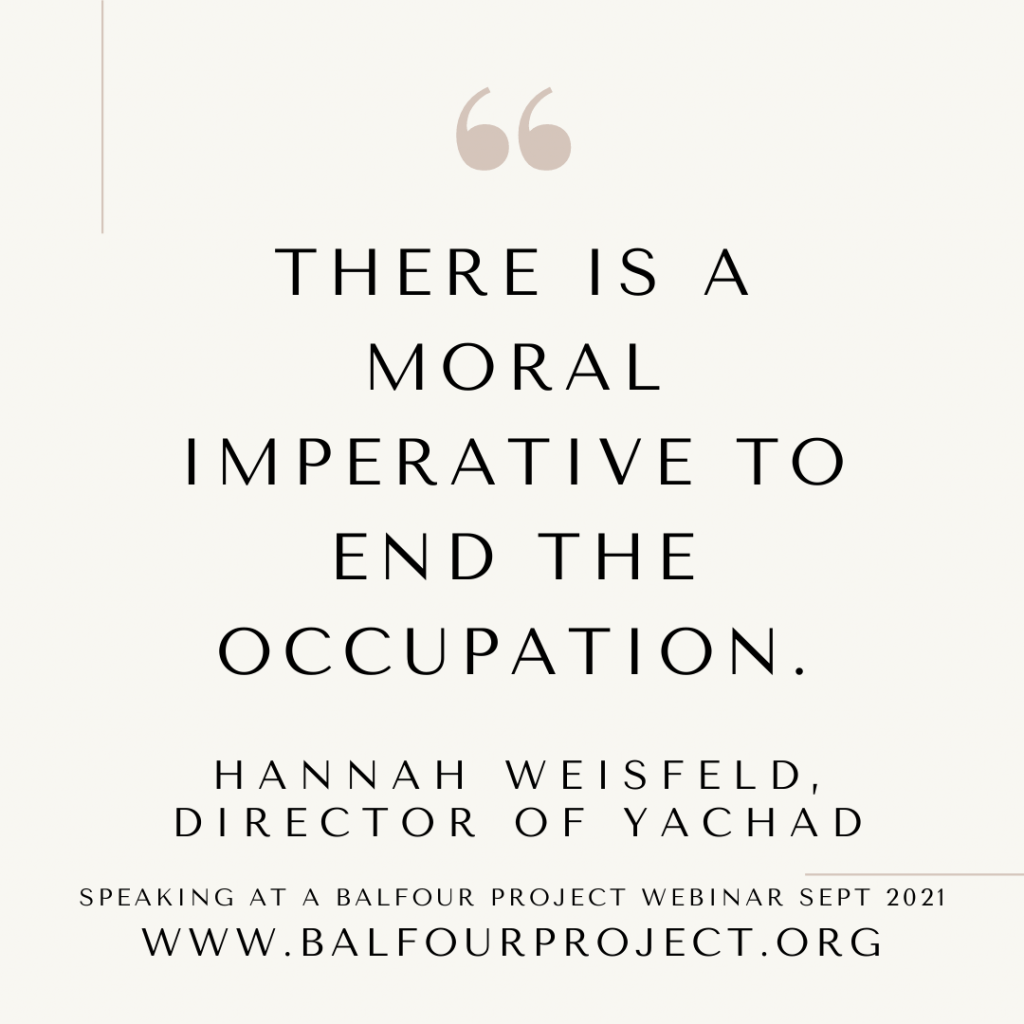
So a significant part of our work is focused on educating the community about the conflict. And that includes things like sending British Jews and delegations to East Jerusalem and the West Bank, and taking young people who are in organised programs out in Israel with youth groups, and adding into their itineraries spending a bit of time in the West Bank and in East Jerusalem, so they can get a greater understanding of what’s going on. In pre-COVID times, we flew over lots of them, Israelis and Palestinians to speak to our community people. Everything from human rights activists, to people that have been previously in the military and in intelligence in Israel, former diplomats, former politicians, to try and present a different perspective. And we have obviously continued to do all of that in this kind of forum on Zoom, throughout the pandemic.
And then the rest of our work is focused on political education and advocacy, which is, how can we use the influence we have, both in the parliamentary context in the UK to better engage parliamentarians on this issue?
How do we show parliamentarians that there is broad support within the Jewish community for resolution to the conflict, and how do we mobilize our supporters to lobby for political change? So our work is very much partly focused on the inside part, partly focused on campaigning and advocacy on the outside. And we’ve been working with the Balfour Projection and lots of other partners quite closely, particularly on parliamentary work for the last three or four years. So it’s nice to be invited here to speak to all of you today.
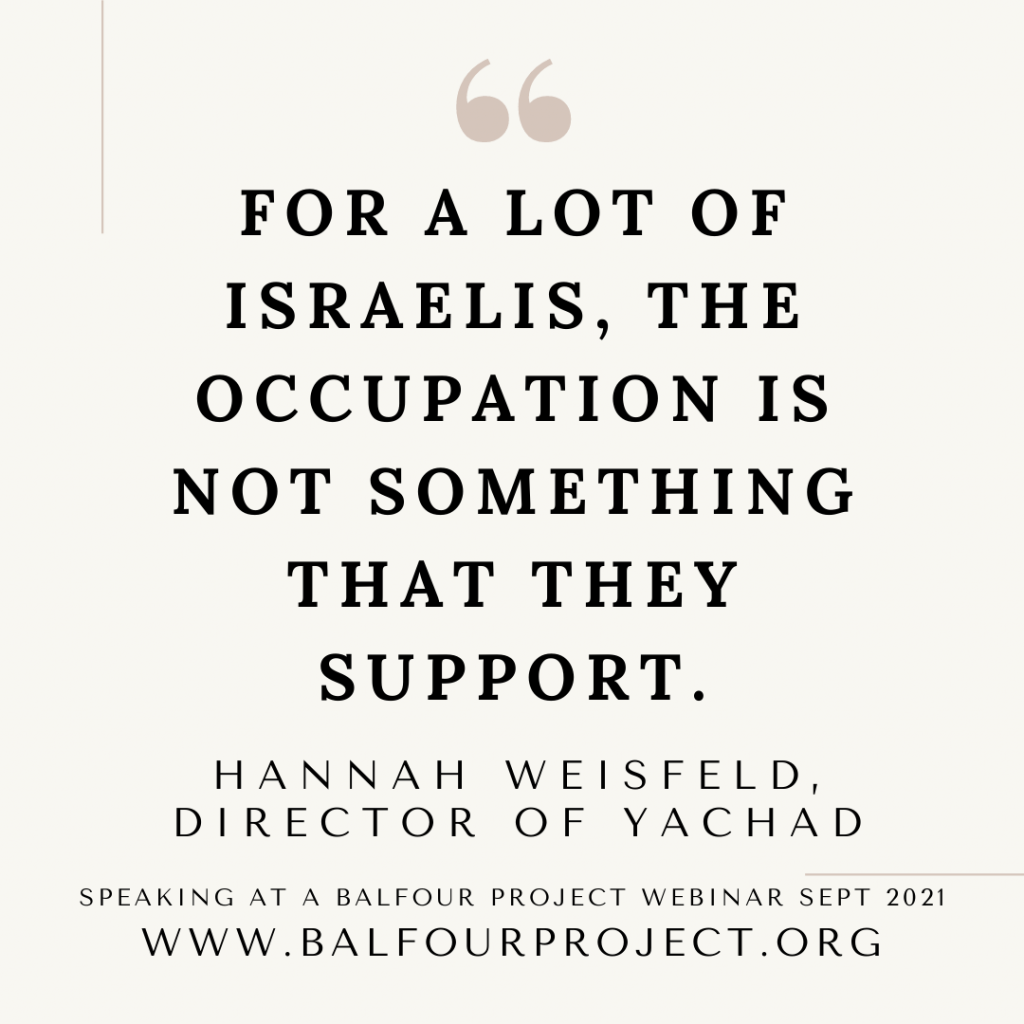
I was going to talk hopefully for about 15 minutes to give you a little bit of an overview, and then I’m really keen to open it up to questions and dialogue and discussion. And obviously people will have different perspectives and opinions.
But when Vincent asked me to speak, they asked if I would talk about why ending the occupation is in the interest of everybody in the region. So I wanted to just give you a very brief overview of how I see it and how we see it as an organisation. And I’m sure that some of what I say will not be new to any of you.
So I guess I’ll start by saying this, I think it’s quite clear that there is a moral imperative to end the occupation. And actually Palestinians can not only thrive, but they can barely survive on occupation. And an occupation which is now 54 years old, that has stifled civil rights, human rights, the economy, has got to the point now where when we were setting up the organisation 10 years ago, there was an imperative to end the occupation for all those reasons.
And I would say 10 years later, that imperative is greater than it’s ever been. It’s quite clear that the impact that the occupation has on the Palestinian people and their ability to even function, let alone have anything that resembles a state, is so severe that I think that anyone who cares about basic human rights or basic civil rights, will understand that the occupation is not a sustainable way to exist for Palestinians, and it’s a status quo that cannot hold.
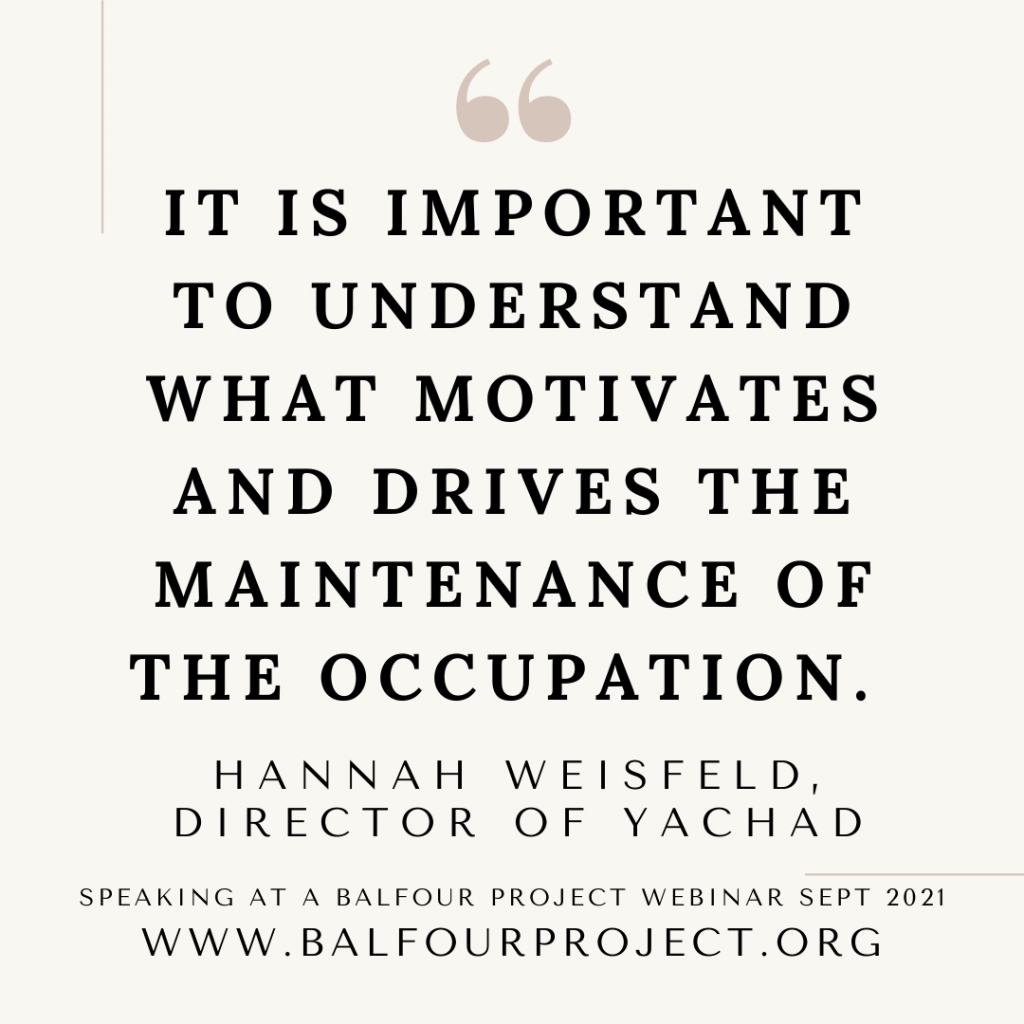
And I would preface everything I say with saying that, that that moral imperative exists. And I assume that most of us would share that analysis. Beyond that, and I guess this is getting into some of the broad issues that I think that is the reason that I was invited to speak today is, how that looks from the other side.
So why is there an imperative for Israel, particularly, who holds the power to end the occupation? And I would say primarily that for a lot of Israelis, the occupation is not something that they support. So we’re not talking about a society of seven million people that support the occupation, we’re talking in the main about a society of people in which actually about half a million people are settlers. And within that half a million people, there’s only about 150,000 to 200,000 who are ideological settlers. So people who are in the West Bank and East Jerusalem for religious reasons and for ideological reasons, because they believe that Israel has a right to that territory. And in fact, if you drill that down even further, and I don’t want to quote you numbers because I haven’t got exact figures there, it’s actually an even smaller minority of people who are extremely ideological settlers.
So the people that, I guess some of us imagine when someone says the word ‘settlers’ is people that are running down hills, burning down olive trees and abusing and Palestinians. And they absolutely exist, and they act absolutely with impunity, but they’re actually quite a small minority of people. And the overwhelming majority of people that are living in the West Bank today, are there for partly ideological reasons, often economic reasons. There’s huge ultra-Orthodox religious communities that are there, because that’s where a community that they’re prepared to live in has been established, and they moved to it. And actually a lot of them don’t even recognise the existence of the state of Israel for theological reasons. So whether you’re over the Green Line or inside the Green Line, is actually neither here nor there. And then there’s a whole body of people inside Israel, who either do or don’t support what’s going on in the West Bank. And primarily people that do support it, support it for security reasons. So they believe that Israel will only be safe and secure, if it maintains the military presence in the West Bank, because of the size of Israel, which is tiny, actually it’s roughly the size of Wales, that there’s an existential fear. And whether people think it’s real or perceived, I think is actually secondary to the fact that people really feel it, that Israel is not safe or secure. And the less land it has, the less safe and secure it will be.
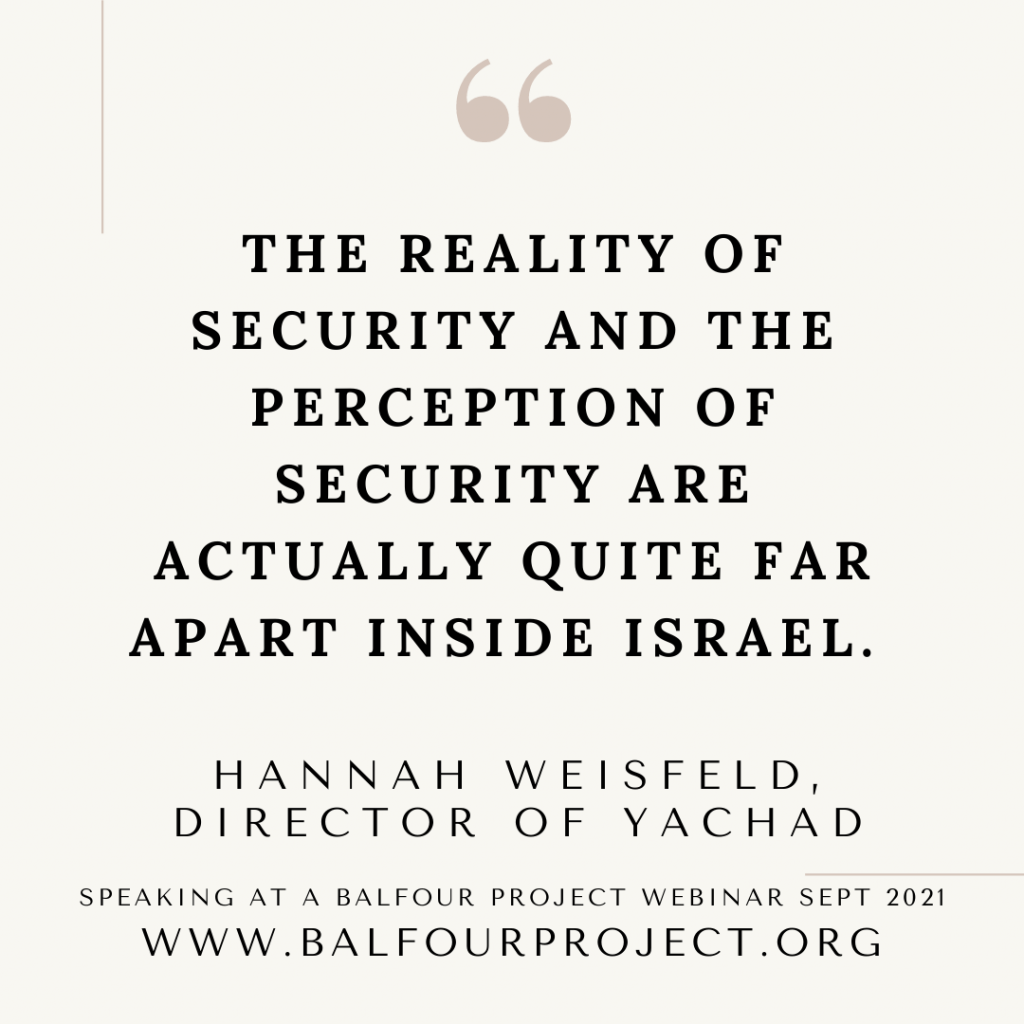
So the reason that I give you that background, is because I think it is quite important to understand what motivates and drives the maintenance of the occupation. And for lots of Israelis, it’s just not relevant to their day-to-day life. So actually, they don’t walk about their day-to-day lives, thinking about whether the occupation should be there or not. And it will take a significant increase in violence, for people to even pay attention to the fact that it exist. And when people in Israel feel that they’re under physical threat, what tends to happen? And I guess this is not surprising, is that they retreat, and they will do the opposite of lobby their government to end the occupation. And a lot of people turn around and say, “Well, we’re fighting a war, and there’s nothing we can do.” So you effectively have a society of people in the main, are not really that engaged day-to-day with the conflict, unless it really flares up, other than those that are ideologically in the West Bank as settlers.
So what’s the imperative for Israel to end the occupation? I would say first and foremost is because Israel can’t survive if it maintains the occupation. So Israel cannot survive in any way, shape or form, either from a security perspective or from a democratic perspective. So what we effectively have today, is one state in which there are citizens and non-citizens. And the point at which that becomes a permanent regime, Israel can no longer claim in any way, shape or form, that it is trying to be a democracy, or it intends to at some point in the future to end the occupation to maintain its democratic character. And I think that the point at which that line has been very clearly crossed. And I think that people will have differences of opinion, and do have differences of opinion as to whether that line has been already crossed. Then Israel cannot survive as part of the democratic Western world, which I think for most Israelis is actually quite an important part of Israel’s character, and certainly the Jews outside of Israel who have an affinity to Israel. So there is a clear imperative for Israel to end the occupation, in order to maintain the democratic character.
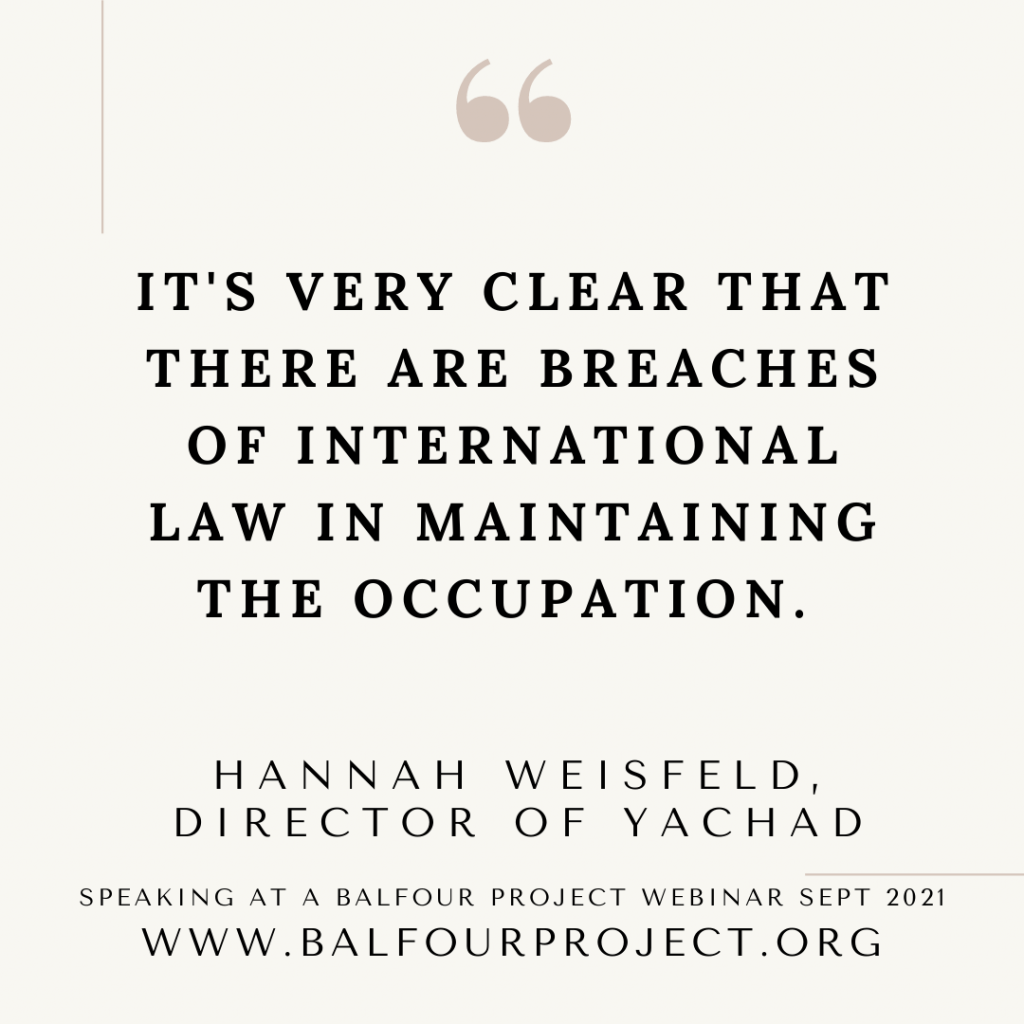
One of the anomalies of the conflict is that, there’s perception that maintaining the occupation is necessary for security. I don’t know how many of you might have seen a film called The Gatekeepers. So The Gatekeepers was made, I think about five or six years ago now. And interviewed the living… Well, they’re not all alive anymore, but the six living former heads of the Shin Bet, so Israel’s security service, so people that know the most about Israel’s safety and security. All of whom went on the record. And I recommended that you watch this documentary, if you’ve not seen it. It’s in Hebrew, but it’s subtitled. All of whom went on the record and said, the biggest single existential threats to Israel’s survival is the occupation.
So it’s not Iran, it’s not Hezbollah, It’s not Hamas. And it’s not to say that those things are not a threat, but all six living former heads of the Shin Bet all said the biggest single threat to Israel security, is the maintenance of the occupation. Because as you effectively are controlling a group of people and ruling over them. A group of people who do not want to be controlled or rolled over, and they are in really close proximity to you. And the idea that Israel can maintain any semblance of long-term security in a situation like that, is certainly to these men who were interviewed, is actually quite nonsensical.
So there is this great irony that people go to the ballot box in Israel, and vote on the grounds of security. So the people voted for 12 years for Benjamin Netanyahu, on the basis that he was good for Israel’s security, when the people who know the most about Israel’s security were effectively saying he’s terrible for Israel’s security.
So perceptions and reality are quite difficult to piece together, because the reality of security and the perception of security are actually quite far apart inside Israel. So from a security perspective, ongoing occupation has the potential to severely undermine Israel’s ability to maintain the security of its citizens. So we have the moral imperative and the impact of the occupation obviously is having on Palestinian life.
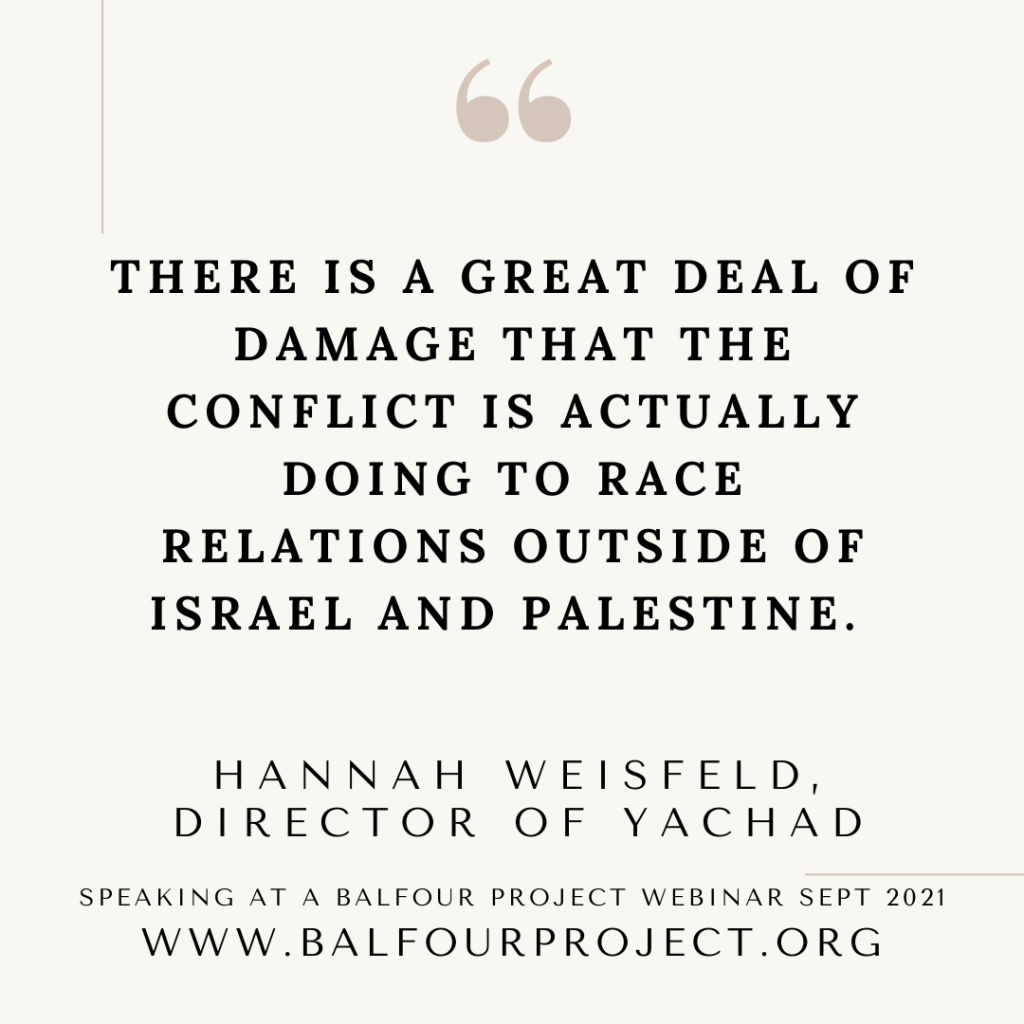
There is a democratic imperative, and there’s a security imperative, and a couple of other things that I wanted to mention, which is that I think that one of the things that we have seen I think in the last few years particularly, is the ongoing maintenance of occupation and the impact that has on international law. So it’s very clear that there are breaches of international law in maintaining the occupation. And the more that Israel maintains that occupation, the more international law is undermined. And I think that that poses quite a grave threat actually to the world, beyond Israel-Palestine, which is that there are very clear and important relationships that Israel has with lots of Western powers, including the UK, as we know, but America and much of Europe. And the more a blind eye is turned to the undermining of an international rules base order, the less safe the world becomes for everybody, because somehow Israel is allowed to ignore those aspects of the law, allowed to get away with breaching them, whatever you want to call it. But what it does over a period of time, is that it undermines the credibility of international law as an independent officer of how the world is run, and how conflicts are dealt with. And I think that there is an imperative for people like us who sit outside, who care about that region, to see that conflict, and particularly the occupation come to an end. Because I think that there are broader ramifications for how we as a global society interact with each other, and how much credibility our international institutions end up having, when they are unable to apply international law to a situation like the occupation, when there are very clear statutes that are written into law to deal with the specifics of what occupation.
There’s two other things which are relevant. And I guess if you zoom out, as I have just done with the international law piece, I think for the region as a whole, I think we’re in a situation now I say this in the context of the Abraham Accords. So Israel having signed normalisation agreements with parts of the Arab world. But Israel’s closer neighbours, countries where Israel has had a direct conflict with. And I’m thinking specifically actually of Jordan. Israel’s ability to be part of a neighbourhood, and for that neighbourhood to be stable, is undermined by an ongoing occupation.
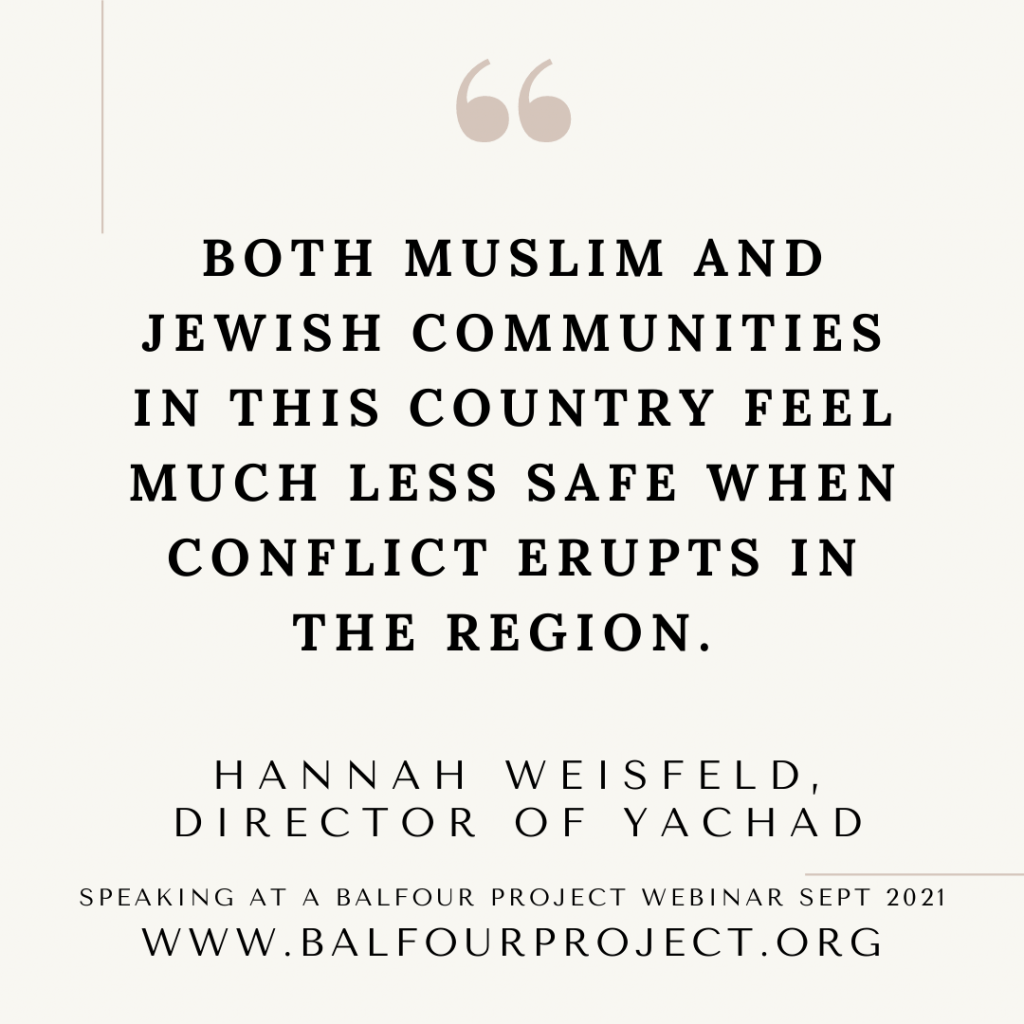
So I don’t believe that Israel is to blame for the instability in the Middle East, I think that’s an incorrect analysis. But what I do think is that for a country like Jordan, which neighbours Israel, Jordan’s ability to be a stable neighbor in the region and an ally is really undermined by an occupation, because it’s ability to place its own citizens, and say that we credibly care about human rights, and we credibly care about your literal brothers and sisters, because so many Jordanians are of Palestinian heritage, I think it’s very difficult for Jordan to do that, and I think it’s very de-stabilising politically. And I think that from a broader international perspective, that’s quite a worrying position, long term.
I don’t know that there is a lot of discussion about what the region could look like, if there was ever peace between Israel and Palestine, and a three-way relationship that could exist between Jordan, Palestine, and Israel, and what that could do to the border region as a whole. And I think that the longer the occupation goes on, the harder it is to ever achieve that, and actually the more damaging it becomes that we can’t. And one final thing I will say, which is very UK-focused and very much does not necessarily impact on the region itself is, I think that there is a great deal of damage that the conflict is actually doing to race relations outside of Israel and Palestine. And by that I mean, I think that the conflict has made it hard for Jews and Muslims to work together outside of the region and in this country. And it has made it difficult to build robust interfaith relationships.
And that doesn’t mean that they don’t exist, because they do. And I can’t claim to be an expert on them, because it’s not something I’m involved in day to day. But it’s certainly the case that both Muslim and Jewish communities in this country feel much less safe when conflict erupts in the region. And there was a huge uptick in violence in this country, and anti-Semitic and Islamophobic in this country in the last round of violence in May, and it makes it very difficult for the two communities to sometimes engage with each other.
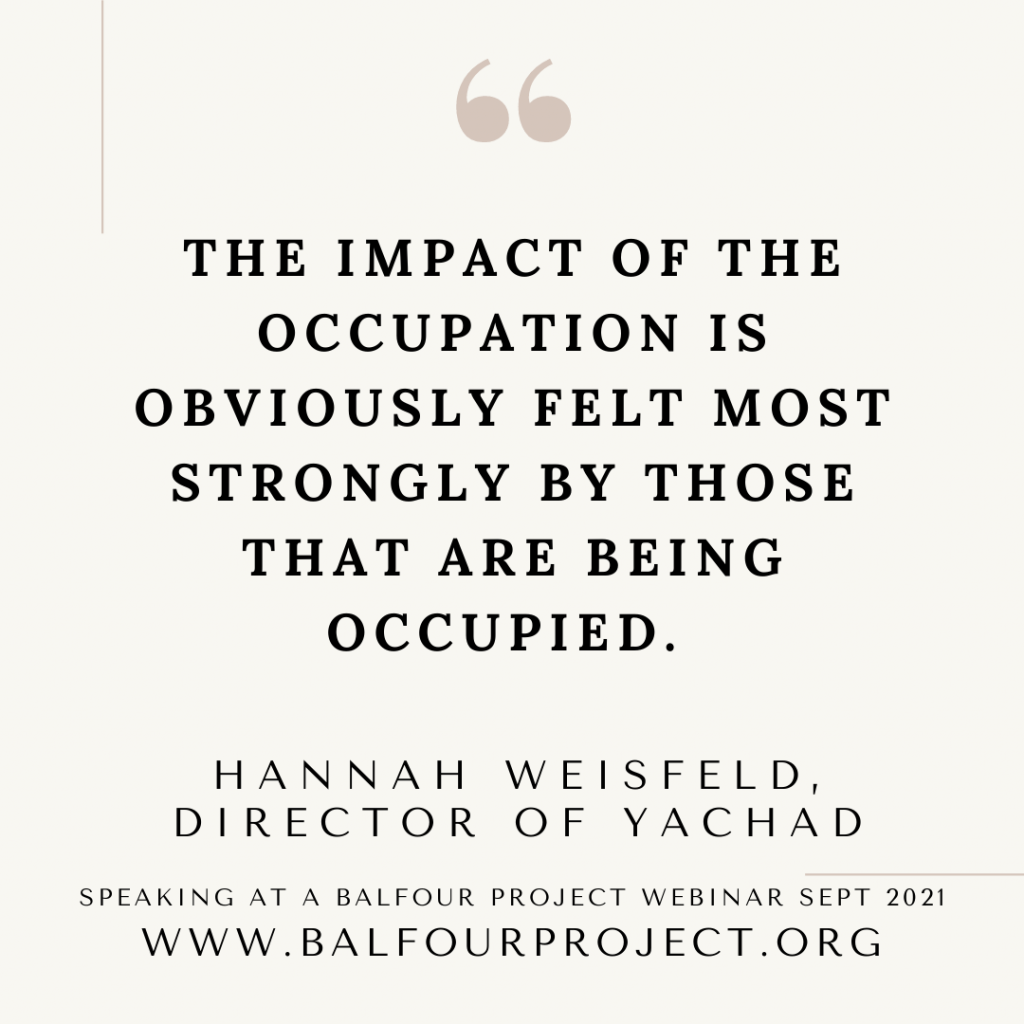
I guess this is quite a self-centered interest, but I think that there is an imperative for communities that are trying to co-exist outside the region for this conflict and for the occupation to end, for the benefit of positive faith relationships outside and in other countries, where the conflict comes between different parties.
And I’ll end now, but I would just say that everything I’ve said is in the context of, it’s quite clear that I think that the primary motivator for why people should be invested in trying to bring this occupation to an end, is because of the impact it has on Palestinians. And I want to re-stress that, because listening to all these other reasons why there is an imperative need to end occupation, sometimes sounds like you’ve forgotten that the people that are the primary victims there, are Palestinians themselves. And I think that it’s important to restate that. That the impact of the occupation is obviously felt most strongly by those that are being occupied and Palestinian people. And I think that the need for there to be a Palestinian state is huge. But our position as an organisation is that in order to even be in a position to imagine a Palestinian today existing, the first thing that has got to happen is that the occupation has got to end. That actually, you cannot have two such unequal partners sitting at the table trying to negotiate peace. We’re in a situation today where, there is one party that has so much more power than the other party. And the idea that from that massive imbalance, you can somehow negotiate a meaningful and long lasting peace, I think is really problematic. And actually there has got to be some equalising of that relationship between Israelis and Palestinians before you can even dream or there being an actual broader resolution to this conflict. So If we are going to look a bit more long term, ending an occupation is one step. And I think once you go beyond that, there is a broader discussion, which is possibly an offer today, which is about what does it mean to have a meaningful peace between Israelis and Palestinians, which I think goes beyond ending the occupation.
Diana Safieh:
Yes, we’ve had a lot of questions already, and I’m sure more will come in as we do our Q&A. I’m going to start with, there’s been a couple of questions on this, so rather than asking individual ones, I wanted to ask you about the IHRA definition versus the JDA definition. And where does Yachad stand on those definitions?
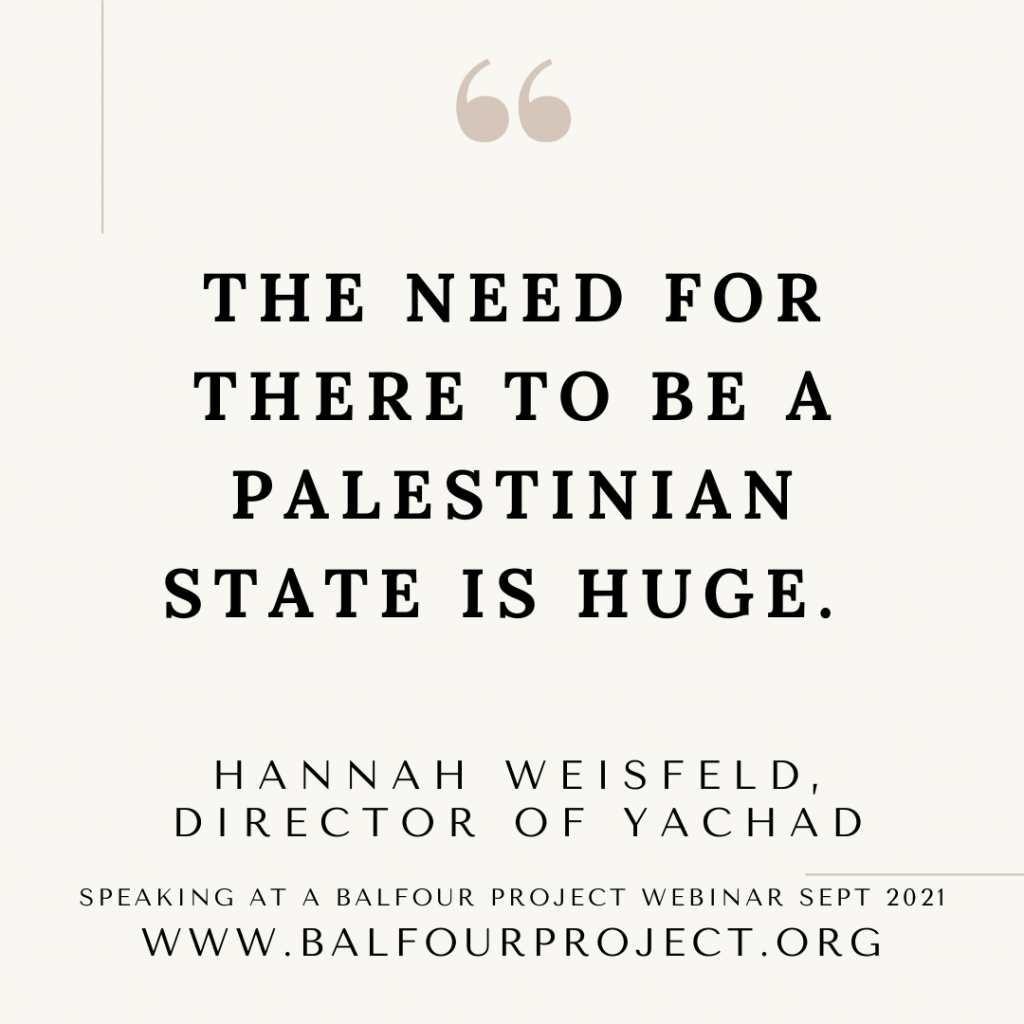
Hannah:
What we have done with JDA is spend quite a lot of time discussing it, talking about it, speaking to some of the people that have written it. And we haven’t got a formal position on it. So I think about three years ago, we publicly stated our support for the Labour Party adopting the IHRA definition, on the basis that it needed to show the Jewish community that it was serious about dealing with anti-Semitism, and then move beyond the discussion on anti-Semitism. So that’s been our engagement to date. That the issue with both IHRA and the JDA and definitions of anti-Semitism, is that an awful lot of time has now gone into tying everybody in knots over what is the best way to define anti-Semitism. And what I think is very problematic, is this notion that it’s a zero sum game, which is either you support the right of Palestinians to self-define as to what they see as anti-Palestinian racism, or you’re against anti-Semitism. But you can’t be both.
And I think that where this discussion with definitions has gone, is to a space that basically says, “Who’s side are you on here? Are you on the side of the Palestinians, or are you on the side of the Jews?” And it’s actually turned what has been a Palestinian/Israeli conflict, into a Palestinian/Jewish conflict, which I think is really actually quite unhelpful and unpleasant. So what we’re trying to do is move beyond the discussion of definitions, because that they’ve soured what is an important discussion about how we end the occupation, how we end the conflict. We certainly don’t believe that everybody who supports BDS is an anti-Semite. And actually, I don’t know that’s what the IHRA definition says it’s all about BDS anyway. But this notion that there are certain means of resisting the occupation, which are as… The method of boycott, divestment and sanctions is not anti-Semitic.
So this idea that there are ways in which you can express your dislike of the occupation, which by default make you an anti-Semite, is not something that we buy into at all.
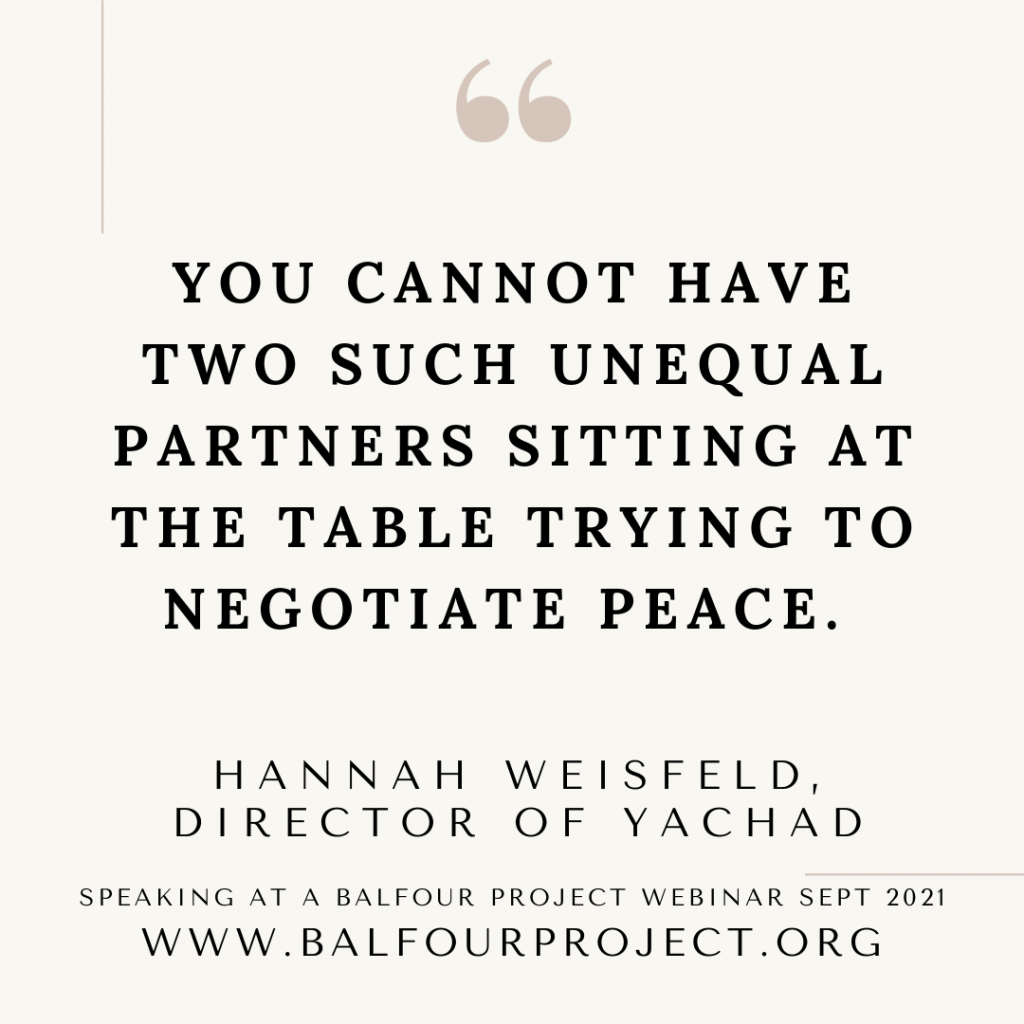
Diana:
Thank you so much for clarifying that a little bit. I should just say that we have a fellowship program that we’re very proud of. And next year we’re hoping to sponsor 20 fellows, the most fellows that we’ve ever sponsored before. But our fellows this year, who are absolutely amazing, have been working on their projects in small groups. And one of the group projects was about the IHRA definition. It’s on our website, under fellows.
So from Peter Blackwood, “what resistance has Hannah experienced to the proposition of resolving the conflict and ending the occupation? What has she found to be successful in overcoming that resistance?”
Hannah:
I presume you’re talking about resistance within the Jewish community, when you say resistance. So like any community, the Jewish community is not remotely homogenous, so we are, I guess I sometimes say to people, Yachad is a bit like Marmite sometimes, in that people either really like what we do, and there are some people that really hate what we do. And then there’s a whole load of people, and I think this is actually really important to acknowledge, who just don’t care. And when I say they just don’t care, it’s that Israel does not inform every action of every Jew in this country. If you look at the academic research that’s been done on British Jews particularly, and some of this applies to an American context, but not all. The overwhelming majority, I mean, significant majority in the 90% plus of British Jews, feel that Israel forms some part of their Jewish identity, and that ranges from a very substantial part to a small part. But that doesn’t necessarily mean that therefore on a day-to-day level, we’re particularly engaged in what’s going on. It’s a cultural thing.
So there is resistance that we experience from some organisations and from some individuals, who really believe that we are damaging Israel, and really believe we’re damaging the British Jewish community. And would like for us to not talk out and public, and definitely would like us to not speak in public spaces like this that are not in a Jewish communal context. And actually, our response to them is in the main is first of all, nobody can claim to speak on behalf of any community. I think that’s quite clear. And that actually if you’re going to be true about what a community already thinks, you’ve got to represent the multifaceted face of community.
But I think that also the idea that presenting to the broader world that every single Jewish supporter of Israel is in support of the actions of the Israeli government, actually is extremely unhelpful. That my experience has been that in more hostile place where I go to talk, people are really pleased to hear that there is a debate going on inside the Jewish community and are really pleased to hear other perspectives. And I don’t think this is unique to the Jewish community, but the idea that I think a lot of minority communities have, which is that they should not air their dirty linen in public, is actually counterproductive. And in actual fact, it’s really important for people to understand. And I saw someone here asked particularly about why is there so much silence in the Jewish community about ending the occupation. There actually isn’t, which is the great irony, is that any space you’d go into in an Anglo-Jewish context, there’s a massive debate going on. And a lot of you probably don’t hear that because you’re not hearing it inside the community. And there is a nervousness to display that outside the community. And we don’t have Jewish media in this country, that’s particularly sympathetic to us. I mean, some of it is a bit more sympathetic. So if you were to pick up a piece of formal Jewish media, you will not see the wide, diverse debate that’s going on, because like every newspaper, newspapers have their own political and editorial line. And they’re not particularly supportive of our position. So there is resistance, but I would say that there’s less than you might think.
Diana:
It’s really interesting to get an insight of what’s going on a bit in the British Jewish community. So how can we reach those people with doubts about the occupation and so forth, within the British community? What can we do to forge links with people from within the British Jewish community, that we might share similar opinions with?
Hannah:
Well, there’s obviously organisations. There’s us, there’s a couple of other organisations like Namod and others who are working on occupation-related stuff, so there’s organisational relationships. But I would say beyond that, I think there’s a really important thing that needs to be acknowledged, which is that there is a fear in the Jewish community that people don’t always have the best interests of the community at heart, and that there are parts of the debate in this country around conflict, which are laced with anti-Semitism. And I think that one of the things that is really important, is for Jews to feel confident that they’re partners. When I say they’re partners, they’re non-Jewish partners, who with them have a vested interest in bringing this conflict and the occupation in particular to an end, also share the interests of Jews.
And I guess to go back to the question about IHRA, this idea that it’s become a zero sum game between Palestinian rights and Jewish rights. I guess to be able to persuade people that that’s not how it’s seen from another perspective, I think is really important as an act of solidarity. Because I just think that there is such a nervousness about people choosing the wrong bedfellows, I think is the best way I can put it. And this idea that there are people who share a common interest in wanting to basically end human rights abuses. And then they discover that actually, when it comes to caring about the future of the Jewish community or anti-Semitism, that the people that they thought they were their partners, were not. So I think that that’s a really important thing as an act of solidarity, to remove the fear that I think exists often with moving the debate beyond the internal walls that exist.
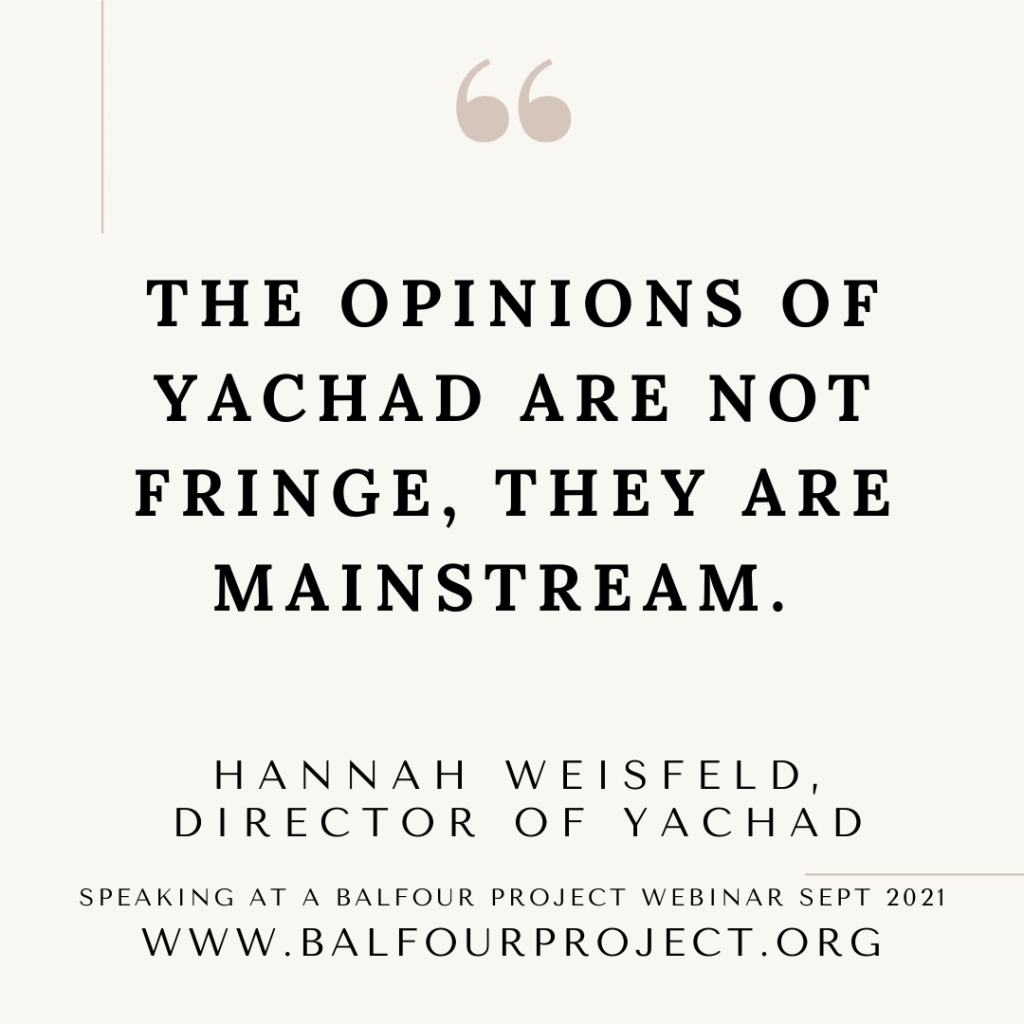
And I would just add to that, that one of the reasons that we established Yachad 10 years ago, was because we knew that people did not feel safe in non-Jewish spaces talking about this. And we wanted to create a space where people felt comfortable basically, to have some of these conversations, and felt comfortable and had the confidence to talk about it. Some people find this slightly controversial, but in non-COVID times, and I hope we will be able to do this again soon, although the regulations are not looking very hopeful at the moment, we take delegations of students out to the region, and we’re quite strict about the fact that they are Jewish only delegations. And the reason that we’re quite strict about that, is because some of this stuff is very confronting. And it’s very confronting to spend four days in the West Bank and to see what’s going on, on the ground. And it’s really important that people can deal with that emotionally, and in an honest way. And I think sometimes it’s difficult for people to do that, when they don’t feel a hundred percent safe, or they’re not a hundred percent sure who they’re having the conversation with. One of our biggest delegations that we take is a student delegation. And when non-Jewish students ask if they can come, our position is basically, it’s open to Jewish students, because it’s about how do we change the debate inside the Jewish community. And we’re aware that sometimes it’s quite hard to do that when people feel exposed.
Diana:
Well on that note, we’ve got a question from Martin Linton, who with Sarah Apps, his wife, they run Travel 2 Palestine, which is another group that does delegations open to all. So if you are interested and you’re Jewish, you can contact Hannah. And if not, contact Martin. But there are ways to get out there and be taken around and see for yourself what’s going on out there on the ground. But Martin Linton asked, “to what extent does Yachad see itself as having a role as an alternative to the Board of Deputies, in terms of expressing a British Jewish view on the occupation?”
Hannah:
Good question. So for those of you who don’t know, the Board of Deputies of British Jews is the British Jewish community’s most established, I think it’s as old as 250 years plus old, major Jewish organisation. It basically has representatives from all synagogues and from community organisations, that send deputies to the Board of Deputies. And the deputies then vote honorary officers who get to then be the democratically elected representatives of the Jewish community. It’s quite an antiquated body. I wouldn’t say it necessarily particularly reflects the demography of the Jewish community, it tends to attract an older generation. And someone asked here, if there’s a generational thing inside the Jewish community, and there definitely is.
So we have a deputy. So we send a deputy to the deputies, and we fought a very hard battle, I think about five, six years ago now, to get elected. And it was really quite hard work, because there were people that were really lobbying for us to not be let in. And the reason for that is because, once you have a seat at the Board of Deputies, you are part of the fabric of Anglo-Jewish life. And as much as people can dislike you and say that they don’t think that we’re representative, it’s much harder to make that case when we have a deputy sitting at the table. So some people take real issue. Parts of the Jewish community I guess who are left, take real issue with the fact that we have a deputy at the Board of Deputies, because they come on and say, “The Board of Deputies doesn’t represent our opinions. And therefore, why are we sitting with a deputy, and someone who’s speaking on behalf of your deputy, and saying things that you disagree with in relation to Israel and the occupation?”
And our position is basically, to answer Martin’s question, we absolutely see ourselves as providing an alternative position. And when things happen in the region, for those of you who follow this debate closely, you’ll see that the Board of Deputies will say something, and we’ll say something completely different. And that happens on a very regular basis. I would say that that’s the normative way in which we coexist with them. But our position is basically that, we see ourselves as an organisation that is part of the mainstream Anglo-Jewish community. This is not a fringe opinion, that the opinions of Yachad are not fringe, they are mainstream. And our supporters are mainstream, and they’re engaged in mainstream Jewish life. So our donors and our supporters, our younger supporters, they’re active on the Jewish societies on campus in their Jewish youth groups. All the supporters and our donors are members of synagogues, they donate to other mainstream Jewish community organisations. This is not a fringe position. And therefore we need to be within those organisations, making sure that those organisations are held to account.
I guess to be really clear, the BBC is never going to call up Yachad and say, “We’d rather have your opinion than the Board of Deputies’ opinion, on what’s going on in Israel.” They might call us up in addition to the Board of Deputies, which is what they do sometimes, but we’ve got to be realistic about the fact that these community organisations exist as representative bodies. And therefore, if we want them to represent the opinions of our supporters, we need to have a seat at the table. And the only way that we will change the narrative, and the only way we’ll get to a point where… Some of you have asked, why don’t we hear those voices? It’s because for so long, progressive voices looked to Jewish community organisations and said, “You don’t represent me. I don’t want to have anything to do with it.”
And you get into what is basically a vicious cycle, which is that people withdraw because they feel unrepresented. And those organisations become even more unrepresentative than they were, and people then don’t want to have anything to do with them. So we have a full-time director of community engagement, and her whole role is about, how do we get our supporters to get more actively involved in the Board of Deputies and other community organisations, to make sure that our voice is heard and they’re actually not drowned out by other voices.
Diana:
Thanks for that. We have a comment from Gillian Mosely. We showed her film recently, Tinderbox, and had a Q&A with her. So we’re really glad that you are joining us, Gillian. But she says, “Hannah, all beautifully expressed. Thank you.” She is Jewish, Gillian Mosely. So she says, “What can Jews in Britain who largely live outside the community do?”
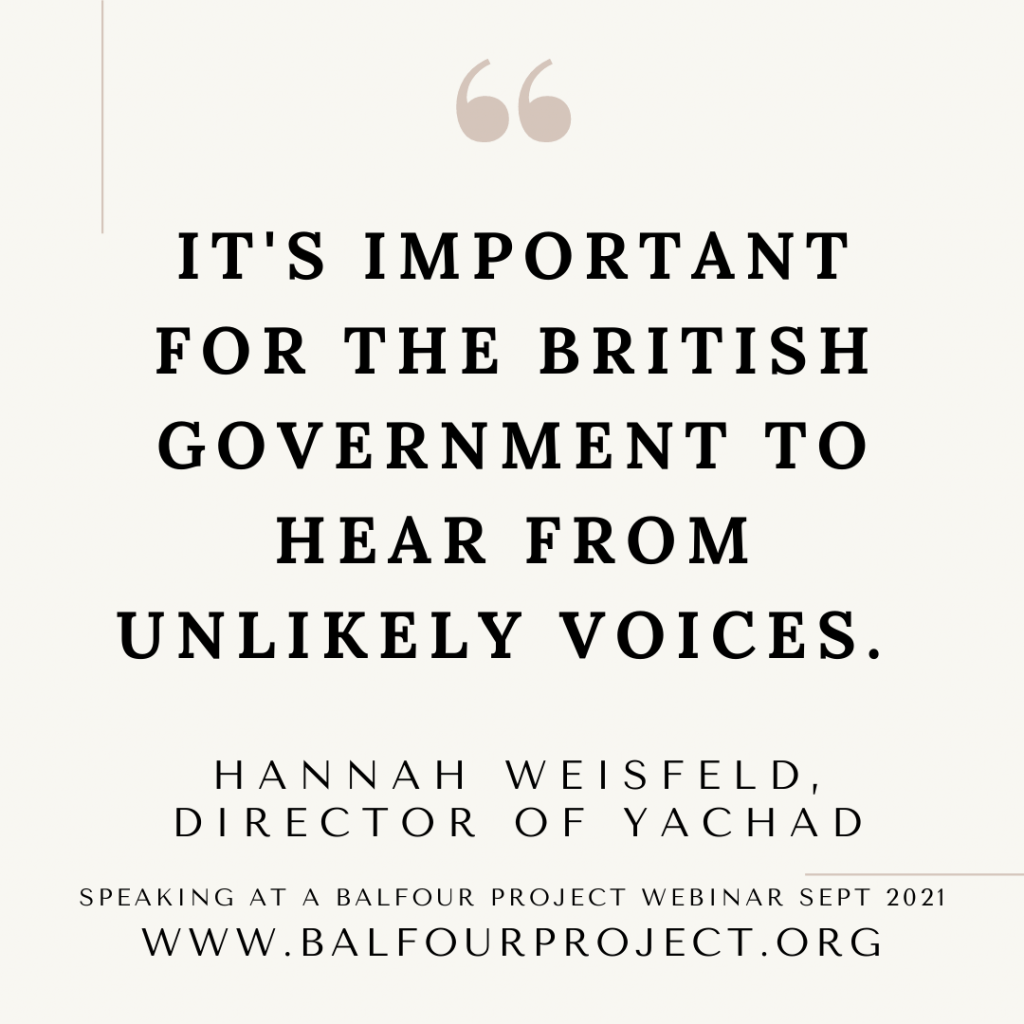
Hannah:
I guess that question applies to anyone really, which is that if you’re not engaged in communal Jewish life and that’s not the framework through which you want to engage, specifically on this issue, that I’m not necessarily qualified to answer that question, only because the focus of our work is on how do we engage Jews in the Jewish communal context. So there’s obviously a whole plethora of organisations that exist in this country, that are dealing with with Israel/Palestine. And I guess whether it’s the Balfour Project, whether it’s Travel 2 Palestine, we have lots of partners and organisations that we will work with. I feel that there’s quite a wide spectrum of opportunities. The one thing I would say though, is that I really think it’s important for the British government to hear from unlikely voices.
One of the thing the Foreign Commonwealth and Development Office, the FCDO, say to us, is that you can’t underestimate the impact that it has when we receive correspondence from unlikely places. So from engaged members of the Anglo-Jewish community, who are part of the mainstream, who are talking about something going on in Israel that’s nuanced, and likewise on the other side. It’s very easy to dismiss the obvious voices, because of course they’re going to say that. So of course members of Palestine Solidarity are going to say this. And of course, Jewish people are going to say this. And therefore, that’s a load of noise that we can ignore because we’ve come to expect that, and we always get that in our postbag. So how do we ensure that there are unlikely things being said by unlikely people? And I think that that’s, I guess what we’re trying to do in a Jewish context, but I think that that challenge applies in a non-Jewish context basically, from the other perspective.
Diana:
Thanks. Our next question is from Wayne David. I don’t know how common a name that is, but I suspect that’s Wayne David MP, so thank you for joining us. “There are signs that the new Israeli governments is taking modest steps to ease the relationship with both the West Bank and Gaza. How significant is this?”
Hannah:
So the jury is really out on the new Israeli government. It’s quite clear that this government is not going to be the government that ends the occupation. And actually, Naftali Bennett, who’s the prime minister, is actually, and some of you might bulk at me saying this, but Bibi Netanyahu in compassion to Naftali Bennett, was actually quite moderate. Bibi Netanyahu was actually a status quo person, so he never really wanted to do anything, he didn’t really want to annex the West Bank, but he didn’t want to give it up. He was quite happy to find a way, basically to maintain the status quo and maintain his power. And in the end he failed at maintaining his power, but he did it for 12 very long years.
Naftali Bennett on the other hand, is really ideological. Naftali Bennett is an ideological settler. I mean, he’s not running down hilltops burning down Palestinian olive groves, and is not a violent settler, but he’s ideological. And he believes Israel has a right to have control and dominion over the West Bank. So in that respect, he’s actually much more extreme. I think the thing that is really different though about this government, is that there’s a massive moderating force that never existed. So you do have in the government, first of all, the Jewish left. So you’ve got Labor and Meretz, both of which are affiliated internationally to the Labour Party here. And you also have an Arab party, United Arab list. And it’s the first time in Israel’s history there’s been an Arab party in the government. So you’re all of a sudden in a situation, where however ideological Naftali Bennett is, there’s limitations on his power that Netanyahu never had.
So I guess to answer Wayne’s question specifically, I don’t think it’s insignificant that attempts are being made to rebuild relationships. I think that that’s really important, in terms of a very low level, at least we can have a functioning dialogue with the Palestinian Authority, because it sets a precedent for behaviour, and it also sets a precedent for future serious discussions. Are they going to make a massive difference? I think it’s probably unlikely. When I say a massive difference, I mean, are they going to make a substantive political difference? I think probably not. Can they potentially ease some of the worst bits of the blockade of Gaza and the occupation? I think that they will. I think that from a pure quality of life point of view, things will probably ease under this government, in a way that they didn’t before. But it’s not going to bring about any significant political change.
Diana:
So the jury is still out, but we shouldn’t be too hopeful as well.
Hannah:
Yeah. But I think basically don’t be too hopeful, but I wouldn’t also be too hopeless. I think that basically the only way out of Netanyahu, was this government. There wasn’t another way. We weren’t going to go from Netanyahu to a left progressive coalition. Now, that’s just never going to happen. And I think that therefore we’ve got to view this as a long game, that this is a stepping stone. And I would just add that what I think is crucially important, and I guess relevant to Wayne as the Shadow Middle-East minister in the Labour Party, is that the progressive camp in Israel has political power now. It hasn’t had political power for a really, really long time, and it has hugely undermined the competence of the Israeli electorate in the Labor Party and Meretz, which is to the left of Labor. Hugely undermined people’s confidence in their ability to govern.
And the fact that they now have a seat at the table, is massive in terms of psychologically what that does to their ability to imagine that they could be empowered with much more power one day. And Israel is governed by a Labor government until 1977. And Labor very nearly disappeared completely as a political party in the last election. And it has had a resurgence with the new leader, but I think that that is a positive thing. And I think it’s something which we’ve got to bear in mind for the future election, that they’re now back in the game, basically.
Diana:
Thanks for that. We’ve got a question from Christopher Hicks. “What tangible parliamentary support is there for your important work, Hannah? I suppose in the UK parliament. Is the support growing?”
Hannah:
No. This would be a good question to ask Wayne, I guess. But I think there is support. We have really good relationships with lots of MPs, more in the Labour Party than the Conservative Party. I mean, we haven’t been for the last few months because of recess, but we are on a regular basis meeting with and talking to MPs. And my feeling is that we play quite a unique role. There’s obviously lots of players that are inside parliament talking about Israel/Palestine, we’re not the only NGO that’s trying to talk to people about this and get them to do something. But I think we have a unique role to play, in that I think that people are nervous about talking about this issue. They’re nervous about saying things. And I think that we provide a perspective which is quite helpful for MPs sometimes, which is giving MPs the confidence to articulate what they think. Helping MPs who are sometimes struggling with how best to articulate something in the way that they want it to come across, so it’s not misconstrued.
And I think that increasingly we are finding the MPs will come to us and actually ask for our help, literally saying, “A constituent has said this to me. What do you think about my reply?” Or, “I want to word a question, can you help me?” Or, “Do you think that this response is okay?” And I think that in that regard, we are seen to be quite helpful. We can be quite helpful partners, basically, for parliamentarians. And I would say if anything, there’s significant ground that we can still cover, and I hope that one day we’ll be able to increase our capacity to be able to do more of it, because we are limited in our reach, because we’re a small organisation.
Diana:
Thank you, Hannah. From Wally Yasbak, “in order to move forward, must the UK admit their grave error and apologise to the Palestinian people, for all the wrongs they caused to Palestine and their human rights?”
Hannah:
I mean, if I’m really honest, I just don’t think that’s ever going to happen. And therefore, I don’t think the UK is that important, basically. And I know now I sound like I’m going to undermine everything that we’re doing, but I think that the UK is a cog, and there are lots of cogs turning in this. And it doesn’t mean that therefore we’re inconsequential, because we’re not. But we are smaller cog in the wheel. And it’s quite clear that the major cog is the Americans, and parts of the Arab world. And then I would say the EU and then Britain. I don’t think that Britain suddenly turning round and saying, “We bear some responsibility for this.” A, I don’t think it’s going to happen. And I, B, don’t think that actually makes any difference, that what tangibly needs to happen to actually now shift the dial. So I don’t think it does ride on that, to be honest.
Diana:
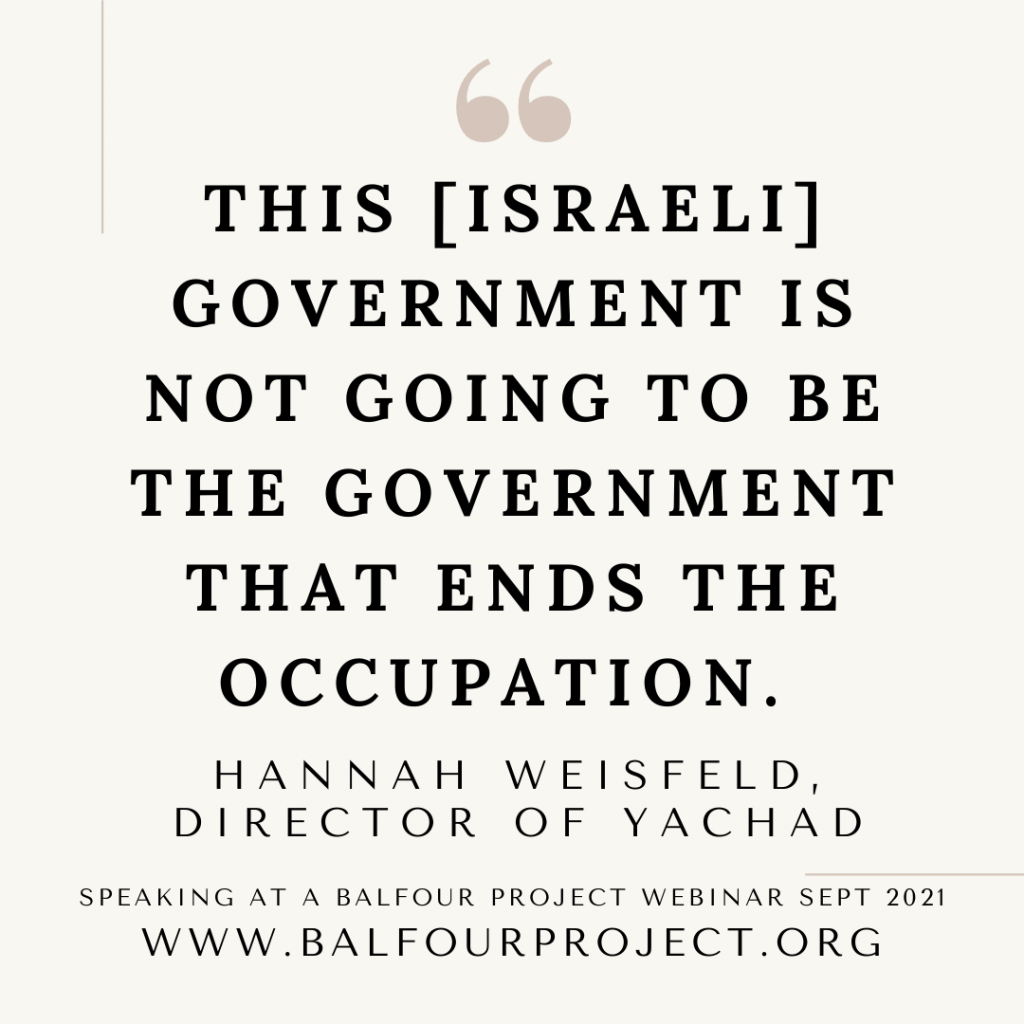
That’s great. Thank you. I’m going to batch two questions, because I think they follow on quite nicely. So from Judith Greengrass. “Could a sea of change of perspectives be gained by impressing on both Palestinians and the international community, by coaxing/encouraging a far more coherent, less corrupt political approach by the Palestinians themselves?” So I guess pressure on the Palestinian government members. And Sally and Bernard Davis. “Which Palestinians, that the Palestinians themselves have confidence in, could the Israelis negotiate with to end this occupation?”
Hannah:
Right. I mean, I think there’s a lot of truth in that first question. I think that often the way this conflict is presented is that, if only Israel did X, Y would happen. And I don’t think it’s formulaic, and I don’t think it’s that black and white. I think that there is a real dearth of leadership from the Palestinian side. There’s clearly a massive lack of trust in the Palestinian leadership, and the sense that it’s an undemocratic, quite corrupt system of rule. And that there’s this symbiotic relationship between the Palestinian Authority in Israel and maintaining the status quo. So I think it’s absolutely the case that a democratisation of Palestinian leadership would make a huge difference, in terms of the ability of the Palestinian people to present themselves in a different way to Israel and the international community.
And I say there are obviously massive limitations on that, because there is a huge power imbalance. But I think it’s naive to pretend that all of this falls on Israel. There’s got to be that, I think there’s got to be a change on the Palestinian side in terms of its leadership, because I don’t think that there will be any progress otherwise. And I also think the other thing that we haven’t talked about, is the split in the Palestinian leadership. Which has been since 2006 now, really. But this split in rule between Hamas in Gaza and the Palestinian Authority in the West Bank is really problematic in terms of there being any way to negotiate with a unified voice.
If I’m being very cynical, I would say that all three parties, Israel, Hamas, and the Palestinian Authority, all have an interest in maintaining that split, it’s to everyone’s collective benefit. And the fact that the Palestinian elections that were supposed to happen this year were canceled, is really depressing because it just maintain the status quo, that you can never move beyond. And actually it becomes really easy for Israel to turn around and say, “Well, there’s no one to talk to. This leadership is split.” And I think that Israel bears significant responsibility in maintaining that split, but it’s not solely responsible for it. And I think that it’s very hard to argue that there is a credible partner to talk to, because who are the leaders? And I say a credible partner, I don’t say that because I think that Palestinians aren’t serious about peace, because I think that most of them are, but I mean a credible political unified voice basically.
Diana:
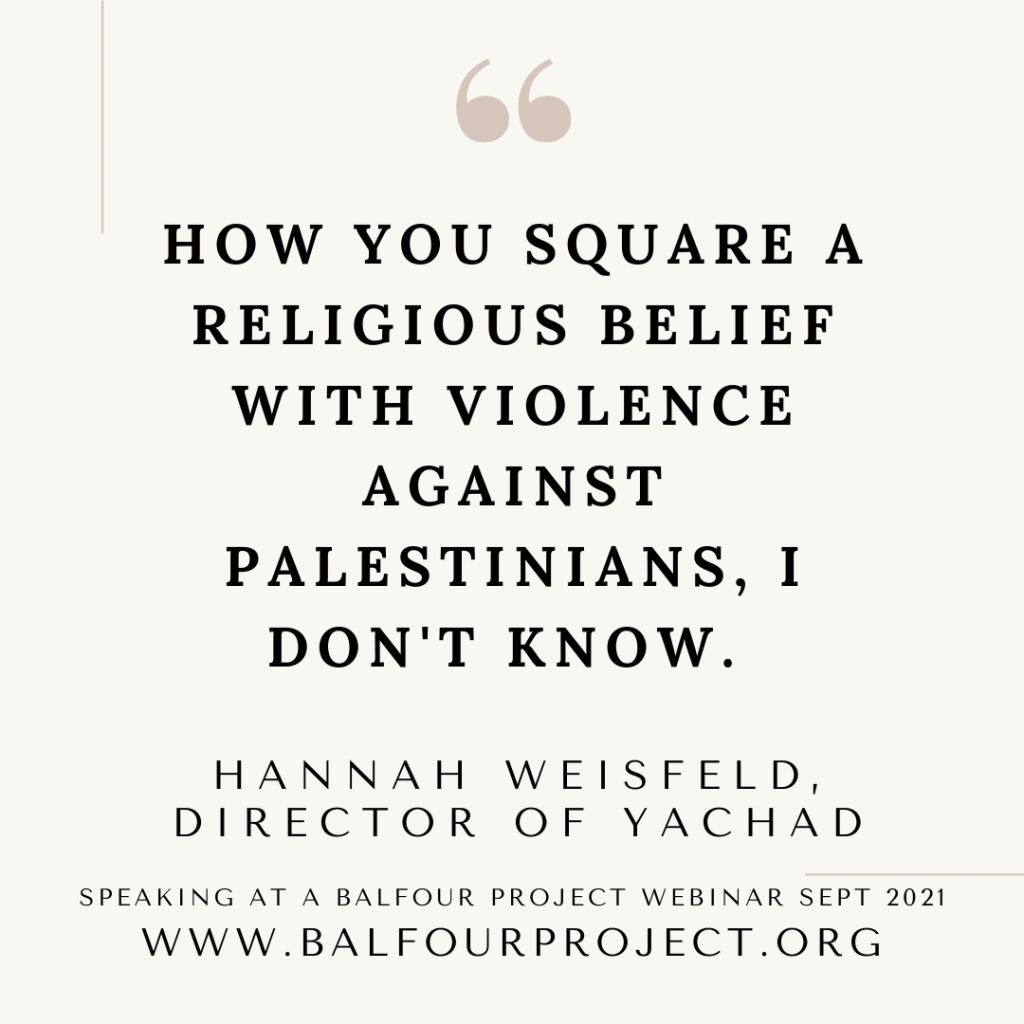
Thank Hannah. Just a little compliment to you from Isolde Moylan, “brilliant analysis, Hannah.” She asked a question that I think you’ve answered already, but I just thought you could do with a little praise. And we’ve got a question from Michael Doe, who’s on our executive committee of the Balfour Project. “If the settlers are not following a religious ideology, the promises to Abraham, et cetera, how do they express their moral justification for what they’re doing?”
Hannah:
Well, again to clarify, I mean, some of them are genuinely, they read the Bible and they say, “We bought this piece of land. It belongs to us. That we have ancient historical rights over it.” So some of them, they really are. I think for ideological settlers who are not religious or driven by that religious sentiment, I think sometimes it’s based on a theory of war, which is, “Well, actually Israel’s under threat. And we won this territory in a war, and therefore it belongs to us.” And you often hear this idea of, there’s no other group of people that still get to call themselves refugees 70 plus years after the war. I mean, we’ll hear people say, “Jews were displaced in the Second World War.” Which they obviously were in the millions. But we don’t claim any longer to be refugees from Eastern Europe, for example. So why is it that when this war has been fought and won, you still, as a Palestinian, claim rights to it. And blame is often put on surrounding Arab countries, for not integrating Palestinian refugees properly, et cetera, et cetera.
So I think that from a moral justification point of view, I guess if you see it as a zero sum game, it’s morally justified. I’m just putting myself in someone else’s shoes, because I obviously don’t think it’s morally justified. I have heard settlers who were not religious say this. And the person that I’m thinking of is Dani Dayan, who used to be the spokesperson for the Yesha Council, which is the settler movement. And Dani’s justification, and go back and watch it, because I don’t want to misquote him. I appeared on a TV show, I think it was called Hard Talk, which was an Al Jazeera program, that Mehdi Hasan used to host, probably about six or seven years ago. And Dani’s position was, this is a zero sum game. And he was non-religious. “This is a zero sum game. And basically I understand that Palestinians believe this land all belongs to them. And I as a Jew believe that it all belongs to me. And therefore, because it’s zero sum, one of us has got to… In a zero sum game, someone’s a loser or someone’s a winner, and I want to be the winner, basically.” I’m simplifying this, I’m being a bit crass in how I’m explaining this. But I think that there’s a group of people who see it like that, that this is a war basically. And there’s winners and losers in war, and we’d rather be the winners than the losers. I think for the most extreme settlers, it’s religion rather than anything else.
How you square a religious belief with violence against Palestinians, I don’t know. Because I find it really problematic that I go to somewhere like Hebron, which I think is the most extreme place you can go in terms of seeing the occupation. And there’s ultra-Orthodox Jews, who in my name to protect Jewish interests, are doing what they’re doing to Palestinians and Hebron. And I do not understand which Jewish values they are applying to that decision, because they’re certainly not mine.
Diana:
Thanks so much for that. Ron Mendel, I hope that answers your question as well, about that conflict between your Judaism religious belief and the moral justifications for some of the actions that take place
I’m going to end on a question from Sir Vincent Fean, who’s the chair of the Balfour Project. And he asks, how do you evaluate the approach of Biden/Blinken? And does Johnson have an approach at all?”
Hannah:
Hi Vincent. I think Biden does not want to engage in this at all, basically. I mean, we knew that before he… There was this massive side release, that Trump didn’t get in for a whole load of reasons, not just this. But on this front, because I think Trump’s position was to just lob grenades. It felt like he was an arsonist, basically. Any opportunity to throw a grenade into the mix and see what it did. So I think that just removing that, I think is a good thing. My sense is, and this is what our American partners said to us from the minute that Biden was on the tickets, he won’t do anything. He might reverse some of the worst elements of what Trump did or he won’t further them at least, but this is not going to be his foreign policy issue.
And I mean, as we have seen, he’s got a pretty major foreign policy issues on his hands right now. And I can’t imagine he wants to have anything to do really with what’s going on there. So my sense is that the Blinken/Biden partnership is a status quo one, which is that, let’s just make sure nothing terrible happens, but we’re not going to burn political capital on trying to make anything good happen, because it probably won’t. And I think that he was obviously around when Kerry spent a huge amount of political capital on a policy that failed. And I think that he probably looks at it and just sees a thing that it will suck the administration’s time. So I don’t think you’ll get very much from them.
I hope that at the least you will get the pressure that stops the very worst things from happening, so that keeps the possibility of conflict resolution on life support. But I don’t think it will take it off life support and advance it, basically.
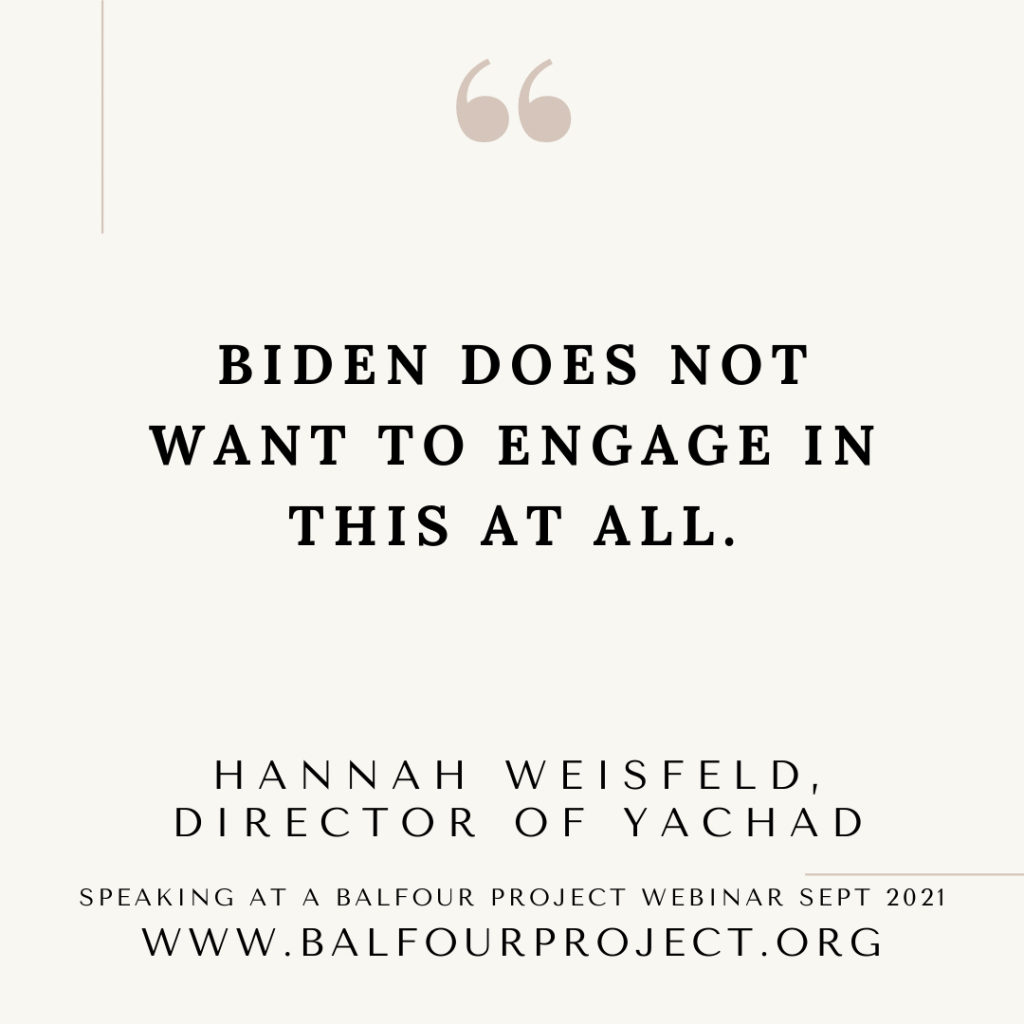
And as for Johnson, I mean, it’s very difficult to tell. Our engagement with the government, and it’s not a prime ministerial level, but we do engage with the government, is that they equally do not have much of a strategy. That their position is to support a two-state solution, to believe that the occupation is illegal, to believe that settlements are a barrier to peace. But they will never do anything substantial, unless it’s really under threat. So the only time you’ve seen an intervention from Johnson is on the eve of the dates where Israel said it would formally annex the West Bank. And Johnson wrote a front page op-ed in a major Israeli newspaper.
And that was important, because I think it showed the Israeli public that the West and their allies were not going to just take it lying down. But it had to get that bad for Boris Johnson to write that op-ed. It had to be the brink of a complete disaster, basically. Whereas you’ve got a constant disaster, that’s just quietly going on. So my sense is that unless there’s really significant noise from the backbench Tory party, that there’s not really any pressure on the government to engage with this issue in a serious way. So they’ll keep on issuing press releases that probably all of us who are in this game could write for them, because we know what they’re saying, and it’s the same press release on repeat. So my sense is that there isn’t much of a strategy.
Diana:
Thank you. Well, that’s us come to time now. Thank you so much for joining us, Hannah. It was really, really interesting hearing what you had to say. Thank you everyone for coming along. We’ve had such an amazing attendance. So it leaves me to say goodbye, really. Thank you so much, Hannah.
Hannah Weisfeld:
Thanks for having me, everybody.
